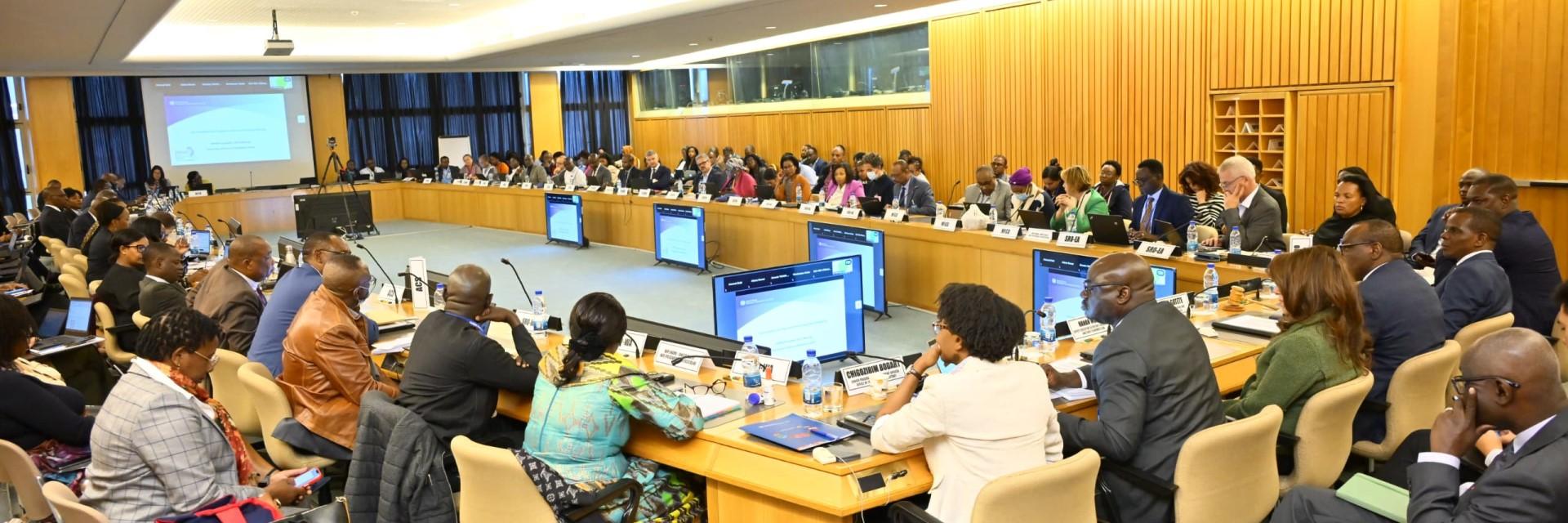Addis Ababa, 3 November 2024 (ECA) - Staff of the Economic Commission of Africa (ECA) on Monday, 2 November, began a five-day meeting of the 4th Accountability and Programme Performance Review Meeting (APPRM) to review the performance of the Commission for the year 2024. The meeting, which is the last for the year, is under the theme: “Enhancing Performance for Results: Lessons from Annual Reporting for Better Planning.”
The APPRM is a quarterly ECA mechanism that ensures accountability and transparency in the planning and assessment of the Annual Business Plan (ABP). It captures contributions from various thematic areas of focus, notes shortfalls, discusses challenges, and identifies future opportunities. The APPRM also provides essential data for corporate performance updates and encourages feedback among staff to enhance the effectiveness of the organisation's initiatives.
Thus, the 4th APPRM seeks to assess progress, celebrate achievements, and address year-end challenges for the ECA based on the Annual Business Plan. The reporting sessions also aim to guide strategic planning and early implementation of the 2025 programmes, projects, and other initiatives. Additionally, the results showcase the ECA's contributions to the Sustainable Development Goals (SDGs) and Agenda 2063, while identifying lessons learned and opportunities for effective program planning.
Executive Secretary Claver Gatete, addressing the opening ceremony, called for a focused approach to consolidate the commission's achievements and establish its relevance.
He said that, in addition to managing routine projects that fall within its core responsibilities, the Commission in 2024 has been engaged in other global and continental initiatives to support the continent's development. He outlined several key advocacy engagements, such as the African Business Forum, which was aimed at enhancing collaboration among business leaders, policymakers, and entrepreneurs. ECA’s coordination of the Africa High-level Working Group on the Global Financial Architecture – a group comprising African Ministers of Finance, Planning and Economic Development, the African Union, the African Development Bank, Afreximbank, and the World Bank with the participation of IMF staff and Executive Directors has been instrumental in advocating for a new work agenda for the International Monetary Fund (IMF) to better respond to the challenges that African low- and middle-income countries are facing.
Furthermore, hosting the Africa Regional Forum on Sustainable Development and the High-Level Political Forum have been key to the global push for fast-tracking the implementation of Agenda 2030 and Agenda 2063 for the Africa we want.
Moreover, ECA supported and participated in the Summit of the Future to engage the younger generation in shaping Africa's future. At COP 29, Mr Gatete further disclosed, ECA championed African climate interests to amplify the continent's voice in global discussions and promote sustainable development among member states.
Said Adejumobi, the Director of Strategic Planning, Oversight, and Results Division (SPORD), the organising division of the APPRM, presenting a review of the annual report, highlighted the importance of adopting a more focused approach through improved planning and collaboration to demonstrate the Commission’s impact on the continent.
In his summary of the 2024 ECA corporate performance, Mr. Adejumobi said that, notwithstanding some of the challenges, the commission achieved some major successes in 2024; a few of these include support for the establishment of a Special Economic Zone for NPK fertiliser in the Republic of Congo. He also mentioned the development of AfCFTA strategies for the Arab Maghreb Union and Morocco, as well as the promotion of green value chains and addressing climate change adaptation in Burundi, Djibouti, Kenya, and the DRC. In Guinea much has been achieved in advancing land reforms in support of the AU Agenda on land.
Others include the commission’s support to Burkina Faso, Niger, and Togo to harness their demographic dividend through budget reforms by 2025 and advocacy for the blue and green economy by assisting in the launch of the East African Community (EAC) blue economy strategic plan, as well as the development of Ethiopia's capital market and Tanzania's monetary policy to ensure the stability of the currencies of these countries.
The four-day meeting will culminate in an intense planning exercise for the 2025 Annual business plan.
Issued by:
Communications Section
Economic Commission for Africa
PO Box 3001
Addis Ababa
Ethiopia
Tel: +251 11 551 5826
E-mail: eca-info@un.org

